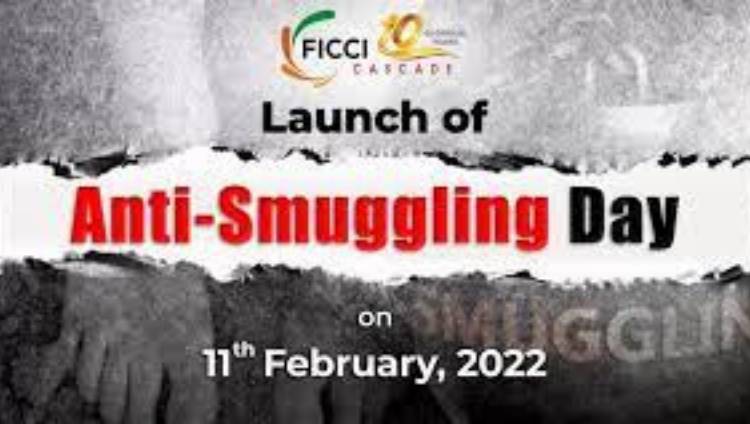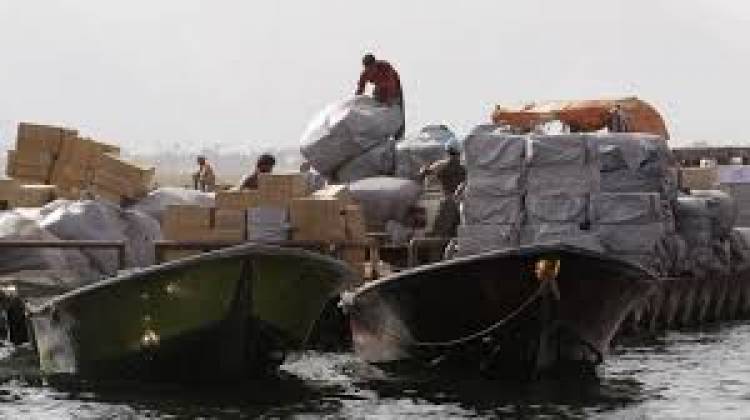ANTI SMUGGLING DAY

Smuggling is the illegal transportation of objects, substances, information, or people, such as out of a house or buildings, into a prison, or across an international border, in violation of applicable laws or other regulations. There are various motivations to smuggle.
While human trafficking aims to exploit a person, who may or may not be a migrant, the purpose of smuggling is, by definition, to make profits from facilitating illegal border crossing. Human trafficking can take place within the victim's home country or in another country.
The Federation of Indian Chambers of Commerce & Industry Committee (FICCI’s) Against Smuggling and Counterfeiting Activities Destroying the Economy (CASCADE) has taken a lead to mark the launch of Anti-Smuggling Day on 11th February beginning 2022. ‘Anti-Smuggling Day’ will represent a major step in the fight against the global menace of smuggling. With no country immune to the impact of smuggling and no single sector can be said to be an exception, this day will highlight the mounting hazard of smuggling. It will not only call for attention to create awareness on this issue but also evaluate what more needs to be done at a national and international level to mitigate this challenge.

Mr. Anil Rajput, Chairman, FICCI CASCADE said, “Illicit trade in smuggled goods is a global problem of enormous magnitude and nations are reeling under its devastating impact. Unfortunately, not enough awareness and thrust is being given to this growing threat, which is draining our economies and leading to job losses and is also a huge risk to the security of nations worldwide. If the spread of smuggling is not checked, the consequences will be disastrous for our future generations and hence we must take a holistic view to curb this evil.”
Anti-Smuggling Day will gather momentum and will bring together policymakers, international institutions, enforcement agencies, industry members, media, and consumers and reinforce their commitment to take action to curb this scourge that is growing every year and affecting all countries.
Mr. Balesh Kumar, Member-Investigation, Central Board of Indirect Taxes and Customs, Mr. P K Das, Director, Compliance, and Facilitation Directorate, World Customs Organisation, Mr. Stefano Betti, Deputy Director-General, Transnational Alliance to Combat Illicit Trade (TRACIT), Mr. Najib Shah, Former Chairman, Central Board of Indirect Taxes and Customs, Mr. DP Dash, Former Pr. Director-General, DRI, Former Chairman, Enforcement Committee, World Customs Organisation (WCO) are slated to address the launch event.

As a run-up to Anti-Smuggling Day, and to sensitize the youth on the menace of smuggled goods, FICCI CASCADE also organized a national Digital Art/Poster making competition on the theme, ‘Stand Against Smuggling’. FICCI CASCADE will also felicitate the winners of the competition during the Anti-Smuggling Day event.
As per the estimates of the World Economic Forum, illicit trade has resulted in an annual drain of US$2.2 trillion (approx. 3 percent of world GDP) in 2020. While nations are increasingly recognizing the dangers posed by this evil business and are intensifying their efforts to create an effective deterrence against such activities, in India, FICCI CASCADE is at the forefront of generating awareness on the detrimental impact of smuggled, contraband, and counterfeit products. As per a 2019 study by FICCI CASCADE, large-scale smuggling in only 5 key industry sectors resulted in a loss of Rs 1,17,253 crore to the Indian economy and job losses to the tune of 16.36 lakhs. With widespread smuggling of various goods and large quantities of the same being seized regularly by our enforcement agencies, this illegal business will only grow in the years to come.

Smugglers have the advantage over governments at the moment because of the lack of an international migration regime in which governments cooperate to prohibit and prosecute smugglers of humans. Smugglers can easily exploit the gaps in the institutional structures of international cooperation as well as the fragmentation of law enforcement efforts. It is also to their advantage that, except for the violence they may inflict, their basic service of supplying cheap labor for receiving countries is widely tolerated even though illegal. Their advantage over migrants is the migrants’ dependence, ignorance, and lack of recourse when agreements are not fulfilled.
Combating smuggling/trafficking requires a systematic understanding of the nature and scope of the problem as well as best practices for controlling these operations. But human smuggling cannot be curbed in isolation. Public authorities must deal with a wide range of related matters including human rights, protection of victims and witnesses, labor and worksite regulation, the factors in source countries that make migration so attractive, and the migration and asylum policies of receiving countries that permit smugglers to bypass regular procedures.
If you liked this post, I’d be very grateful if you’d help it spread by emailing it to a friend or sharing it on Twitter or Facebook. Do not forget to like us on Facebook and follow us on Instagram. Send your entries too…
Thank You
Aashi Harita



























Comments (0)